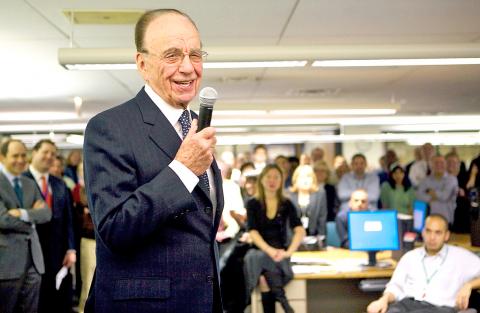Dow Jones, the parent company of the Wall Street Journal, began a sweeping round of job cuts on Thursday, including eliminating entire teams of reporters and closing international bureaus.
In a memo to the staff on Thursday, Journal editor Gerard Baker said that the company was trying to transform to a more digital operation.
“This process inevitably requires us to discontinue some of our activities as we invest more in others,” he said.

Photo: AP
He listed challenges that the company faces and outlined its strategy in the memo, which had the subject line “The Next Steps.”
Job cuts are mentioned for the first time in the ninth paragraph.
“We will be consolidating some areas of coverage, merging some bureaus and teams, and discontinuing completely some of what we do,” he said.
That includes reducing the size of European bureaus and closing those in Prague and Helsinki, he said. He said the company would reduce the number of blogs and eliminate the small-business group and the New York-based economics team.
There will be “some further elimination of positions, and a number of our colleagues will be taking buyouts, as is customary at the end of the fiscal year,” he said.
Some in the newsroom feared that meant more layoffs before the end of the month.
Baker did not specify the number of cuts, and it is not clear precisely how many positions will be eliminated or where they will fall, said Tim Martell, a representative of the union, the Independent Association of Publishers’ Employees.
Baker said that, alongside the cuts, over the next few months, the company would be “adding dozens more jobs in the critical areas of business, finance, technology, markets and global economics.”
The company has made staff reductions for several years as the end of its fiscal year approached. Reporters and editors in the New York office of the Journal had been bracing for a more brutal round than usual this year.
News Corp, which owns Dow Jones, said in its most recent earnings report that revenue in the news and information part of the business was down 9 percent, or US$135 million. Advertising revenue was down 12 percent, the report said, driven in part by weakness in print advertising. Circulation and subscription revenue dropped 6 percent.
Within the newsroom, current and former staff members speaking on the condition of anonymity said that reporters and editors had grown used to losing colleagues. Dow Jones has opted to make cuts quietly, they said, and so it is not unexpected to find previously occupied desks empty.
By midmorning on Thursday, the layoffs had begun at the Journal, with journalists called into meetings, those present in the newsroom said.
No official notification was sent to the staff before the meetings began.

CAUTIOUS RECOVERY: While the manufacturing sector returned to growth amid the US-China trade truce, firms remain wary as uncertainty clouds the outlook, the CIER said The local manufacturing sector returned to expansion last month, as the official purchasing managers’ index (PMI) rose 2.1 points to 51.0, driven by a temporary easing in US-China trade tensions, the Chung-Hua Institution for Economic Research (CIER, 中華經濟研究院) said yesterday. The PMI gauges the health of the manufacturing industry, with readings above 50 indicating expansion and those below 50 signaling contraction. “Firms are not as pessimistic as they were in April, but they remain far from optimistic,” CIER president Lien Hsien-ming (連賢明) said at a news conference. The full impact of US tariff decisions is unlikely to become clear until later this month

With an approval rating of just two percent, Peruvian President Dina Boluarte might be the world’s most unpopular leader, according to pollsters. Protests greeted her rise to power 29 months ago, and have marked her entire term — joined by assorted scandals, investigations, controversies and a surge in gang violence. The 63-year-old is the target of a dozen probes, including for her alleged failure to declare gifts of luxury jewels and watches, a scandal inevitably dubbed “Rolexgate.” She is also under the microscope for a two-week undeclared absence for nose surgery — which she insists was medical, not cosmetic — and is

GROWING CONCERN: Some senior Trump administration officials opposed the UAE expansion over fears that another TSMC project could jeopardize its US investment Taiwan Semiconductor Manufacturing Co (TSMC, 台積電) is evaluating building an advanced production facility in the United Arab Emirates (UAE) and has discussed the possibility with officials in US President Donald Trump’s administration, people familiar with the matter said, in a potentially major bet on the Middle East that would only come to fruition with Washington’s approval. The company has had multiple meetings in the past few months with US Special Envoy to the Middle East Steve Witkoff and officials from MGX, an influential investment vehicle overseen by the UAE president’s brother, the people said. The conversations are a continuation of talks that

Alchip Technologies Ltd (世芯), an application-specific integrated circuit (ASIC) designer specializing in artificial-intelligence (AI) chips, yesterday said that small-volume production of 3-nanometer (nm) chips for a key customer is on track to start by the end of this year, dismissing speculation about delays in producing advanced chips. As Alchip is transitioning from 7-nanometer and 5-nanometer process technology to 3 nanometers, investors and shareholders have been closely monitoring whether the company is navigating through such transition smoothly. “We are proceeding well in [building] this generation [of chips]. It appears to me that no revision will be required. We have achieved success in designing